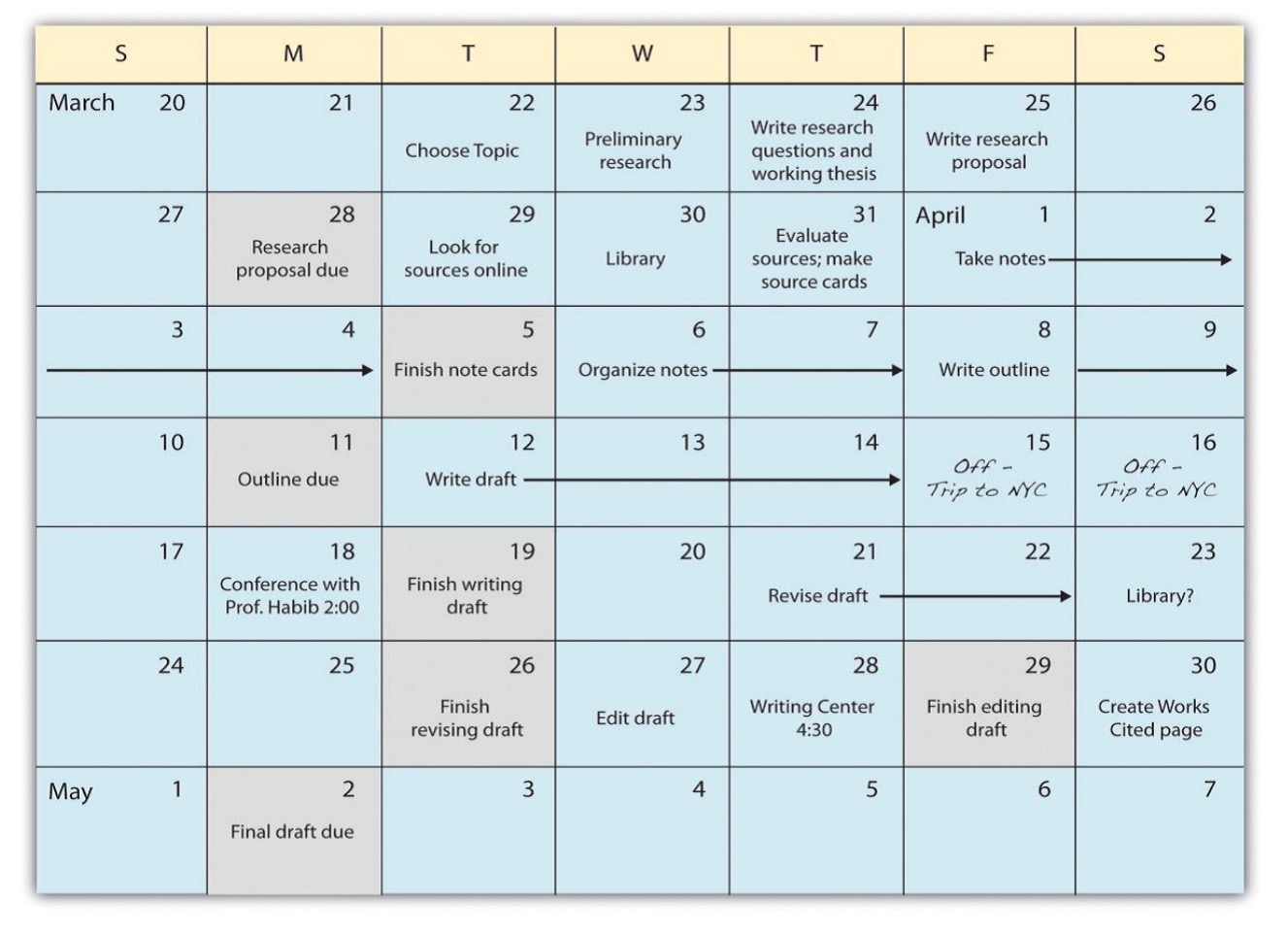5.2: Choosing Your Topic
- Page ID
- 28081
Choosing Your Topic

Your first step is to establish a point of departure for your research project. Depending on your specific professor's assignment directions, you may get to choose your topic completely, you may get to choose a topic within a frame, or you may get to choose a topic from a list provided by the professor.
- To narrow the focus of your topic, brainstorm using prewriting techniques, as well as any guidance or texts given by your instructor.
- Once you're sure of your topic, formulate a specific research question (a broad, open-ended question) that will guide your research.
Your research will help you answer that question or answer another question that you realize is more interesting or useful. It's important to set aside adequate time for this part of the process. Fully exploring ideas will help you build a solid foundation for your paper.
Identifying Potential Topics
When you choose a research topic and a question about that topic, you are making a major commitment. Your choice will help determine whether you enjoy the lengthy process of research and writing and whether your final paper fulfills the assignment requirements. If you choose your topic hastily, you may later find it difficult to work with your topic. By taking your time and choosing carefully, you can ensure that this assignment is not only challenging but also rewarding.
Writers understand the importance of choosing a topic that fulfills the assignment requirements and fits the assignment's purpose and audience. Choosing a topic that genuinely interests you is also crucial. You instructor may provide a list of suggested topics, a category of topics, or ask you to develop a topic on your own.
You may find inspiration for topic ideas in your everyday life, by browsing magazines, or looking at lists of topics or themes in online databases such Academic Search Premier, Opposing Viewpoints, CQ Researcher Online, Bloom's Literary Reference Online, and Literature Resource Center.
 In addition to Prewriting , use free online tools such as Topic-o-rama and Wridea , to help you brainstorm your topic.
In addition to Prewriting , use free online tools such as Topic-o-rama and Wridea , to help you brainstorm your topic.
You may benefit from identifying several possibilities before committing to one idea. Building a list of potential topics will help you to identify additional, related topics.
In this chapter, you will follow a writer named Jorge, who is in a class studying conflicts in American Higher Education, as he prepares a research paper.
Jorge was assigned to write a research paper on current debates about college in the U.S.:
Assignment: Write a 5-6 page research paper on current debates about college in the United States.
Within this framework, Jorge had to decide which specific issues interested him. He brainstormed the following list of possibilities:
- College sports
- Tuition
- Free Speech on campus
- Campus safety
- Campus tech fees
- State funding for higher ed
- Financial aid
- Digital classrooms
- Prescription drug use by students
- Alcohol and college students
- Fraternities and Sororities
- Student activity fees
Focusing on a Topic
After identifying potential topics, Jorge needed to evaluate his list and choose one topic to pursue as the focus of his research paper. Once he had a narrow enough topic, his next step is to develop a research question about that topic. Discussing his ideas with his instructor, peers, and tutors will help ensure that he chooses a manageable topic that fits the requirements of the assignment. The following were some questions Jorge considered:
- Will I be able to find enough information about the topic?
- Can I take an arguable position on the topic?
- Is the topic too broad or too narrow for the scope of the assignment? If so, can I modify the topic so it is more manageable?
He needed to narrow his topic so he could formulate a concise, manageable question about it.
Most writers find that the topics they listed during brainstorming or idea mapping are too broad for the scope of the assignment. Working with an overly broad topic, such as "financial aid," can be frustrating and overwhelming.
Each topic has so many facets that it would be impossible to cover them all in a college research paper. However, more specific choices, such as "the pros and cons of sexual education," "children's television programs," or "the physical effects of the South Beach diet," are specific enough to write about without being so narrow that they can't sustain an entire research paper.
A good research paper provides focused, in-depth information and analysis. If your topic is too broad, you will find it difficult to do more than skim the surface when you research it and write about it. To narrow your focus, explore your topic in writing. Also, conduct preliminary research, including discussing the topic with others. Keep in mind that you will have to narrow your search.
You may be asking yourself, "How am I supposed to narrow my topic when I haven't even begun researching yet?" In fact, you may already know more than you realize.
Review your list and identify your top two or three topics. Set aside some time to explore each one through Prewriting Techniques. Taking the time to focus on your topic may yield fresh angles.
For example, Jorge knew that he was especially interested in the topic of "college athletics,"but he also knew that it was much too broad for his assignment. He used freewriting to explore his thoughts so he could narrow his topic.
Read Jorge's ideas from his freewriting:
I wonder if college athletes should get paid. I've been thinking a lot about the article we read in class: “Get Your Stadiums Out of Our Churches," & how universities spend millions of dollars for sports (mostly basketball and football) and make money out of it. However, for the universities and colleges to make that money, they make players play without even paying them. This is a huge problem because only 1 percent of football players make it to NFL. All the other 99 percent just wasted their energy and time for nothing.
I am a huge fan of college sports. I still watch it while hating that players are not being paid. I have a debate with my friends always about college sports. Most of the people I know said that college players are being paid by getting free learning in the university they are playing for. But I'm not sure that they're actually getting that education--there was that program (I think in North Carolina?) where players were getting fake class grades in Swahili and other stuff so that their GPA can go up. I think Joe Nocera wrote about this. The problem is that, the universities are giving students and empty grade and calling it an education. This is really messed up because college is where people know things or many students are mature and know things. However, when it comes to football, everyone looks the other way as if they don’t know what was happening.
I love college football and basketball, but now I am starting to hate the game because of what the universities are doing. The universities even own players and make money out of them and don’t give them anything. But is paying them the answer? What would that even look like? Would they still get a degree?
Conducting Preliminary Research
Conducting preliminary research can happen a few different ways. Talk about your ideas with your classmates, friends, and family. Exploratory reading can help you identify interesting angles.
Surfing the web is a good way to start, as is finding sources that your class texts refer to (as Jorge did). Find out what people are saying about your topic in online newspapers, magazines, blogs, and discussion boards. Keep in mind that the reliability of online sources varies greatly.
In this exploratory phase of your research, you do not need to evaluate sources as closely as you will later; however, use common sense as you refine your paper topic. If you read a fascinating blog comment that gives you a new idea, search for some fully developed sources on that topic to see if it's worth pursuing.
If you are writing a research paper for a specialized course, look back through your notes and course activities to identify potential topics. Remind yourself of reading assignments and class discussions that especially engaged you. Doing so can help you identify topics to pursue. If the readings or viewings assigned in your course deal with your topic, then review and take notes on those materials.
Librarians and instructors can help you to determine if there are enough sources available on your topic, or if there are so many sources that it would be wise to narrow your topic further.
Jorge's freewriting exercise helped him realize that the assigned topic of current debates in higher education intersected with a few of his own interests: sports, education, and justice.
Preliminary online research and discussions with his classmates strengthened his impression that many people are confused or misled by media coverage of these subjects. Jorge decided to focus his paper on a topic that seemed to be gaining attention: whether universities should be paying their athletes, and how that could happen. He wanted to find out more.
 At work, you may need to research a topic quickly to find general information. This information can be useful in understanding trends in a given industry or generating competition. For example, a company may research a competitor's prices and use the information when pricing their own product. You may find it useful to skim a variety of sources and take notes on your findings.
At work, you may need to research a topic quickly to find general information. This information can be useful in understanding trends in a given industry or generating competition. For example, a company may research a competitor's prices and use the information when pricing their own product. You may find it useful to skim a variety of sources and take notes on your findings.
Exercise: Choosing a Topic

Step 1
Set a timer for five minutes. Use prewriting to create a list of topics you would be interested in researching for a paper about the influence of the Internet on social networking. Which social networking sites do you and your friends use? Do you closely follow a particular social media website, such as Twitter? Would you like to learn more about a certain industry, such as online dating? Would you like to learn more about people's use of the Internet to build support for social causes? List as many ideas related to this topic as you can.
Step 2
Choose two topics from the list you created . Spend five minutes freewriting about each of these topics. Choose the topic you most enjoyed freewriting about. Then, review your freewriting to identify possible areas of focus.
Step 3
Swap lists of potential topics with a classmate. Select one or two topics on your classmate's list about which you would like to learn more. Explain to your classmate why you find those topics interesting. Ask your classmate which of the topics on your list s/he would like to learn more about and why.
Determining Paths of Inquiry

Your freewriting and preliminary research have helped you choose a focused, manageable topic for your research paper. To work with your topic successfully, you will need to determine what exactly you want to learn about it and what you want to say about it. Before you begin conducting in-depth research, you will further define your focus by developing a research question.
By forming research questions about your topic, you are setting a goal for your research. Determine your main question, the primary focus of your paper, and several subquestions that you will need to research in more depth to answer your main question. Your main research question should be substantial enough to form the guiding principle of your paper, but focused enough to guide your research.
A strong research question requires you not only to find information but also to put together different pieces of information, interpret and analyze them, and figure out what that body of knowledge--your sources--says is the answer.
As you consider potential research questions, ask yourself whether they would be too hard or too easy to answer. Review the results of your prewriting, and skim through your preliminary research. From these, write both simple, factual questions and more complex questions that would require analysis and interpretation to answer.
Below are the research questions Jorge will use to focus his research. Notice that his main research question has no obvious, straightforward answer. Jorge will need to research his subquestions, which address narrower topics, to answer his main question.
Topic: College athletes
Main question: Should colleges and universities pay college athletes?
Subquestions:
- What are the justifications for not paying them?
- What is the history of college sports?
- How did this system evolve?
- What do the athletes say?
- Have there been any recent court cases dealing with this?
- Who is on what side?
- How would paying them work?
 Before you begin a new project at work, you may have to develop a project summary document that states the purpose of the project, explains why it would be a wise use of company resources, and briefly outlines the steps involved in completing the project. This type of document is similar to a research proposal for an academic purpose. Both define and limit a project, explain its value, discuss how to proceed, and identify what resources you will use.
Before you begin a new project at work, you may have to develop a project summary document that states the purpose of the project, explains why it would be a wise use of company resources, and briefly outlines the steps involved in completing the project. This type of document is similar to a research proposal for an academic purpose. Both define and limit a project, explain its value, discuss how to proceed, and identify what resources you will use.
Managing Your Research

Choosing a Topic helped you begin to plan the content of your research paper: your topic and the research question. It is equally important to plan out the process of researching and composing the project. Although some types of writing assignments can be completed relatively quickly, developing a good research paper is a complex process that takes time and attention. Careful planning helps ensure that you will keep your project running smoothly and produce your best work. Think about how you will complete each step and what resources you will use. Resources may include anything from online databases and digital technologies to interview subjects and writing tutors.
Scheduling Research and Writing
Set up a project schedule that shows when you will complete each step. To develop your schedule, use a calendar and work backward from the date your final draft is due.
Generally, it is wise to divide half of the available time on the research phase of the project and half on the writing phase, keeping in mind that you should be writing as you're researching (notes and engaging with the material) and that as you begin to bring those notes into a draft, you may have to do more research as you discover more.
If you have a month to work, plan for two weeks for each phase. If you have a full semester, plan to begin research early and to start writing by the middle of the term. You might think that no one really works that far ahead, but try it. You will probably be pleased with the quality of your work and with the reduction in your stress level.
Plan your schedule realistically, and consider other commitments that may sometimes take precedence. A business trip or family visit may mean that you are unable to work on the research project for a few days. Make the most of the time you have available.
Plan for unexpected interruptions, but keep in mind that a short time away from the project may help you come back to it with renewed enthusiasm. Another strategy many writers find helpful is to finish each day's work at a point when the next task is an easy one. That makes it easier to start again. Also, consider keeping a writing log, where at the end of each work session, you list the work you did that day or that session and what you plan to do next time you sit down to work on the project.
As you plan, break down major steps into smaller tasks if necessary. For example, conducting research, involves locating potential sources, evaluating their usefulness and reliability, reading, and taking notes. Defining these smaller tasks makes the project more manageable by giving you concrete goals to achieve.
Jorge's Research Paper
Jorge had six weeks to complete his research project. Working backward from a due date of May 2, he mapped out a schedule for completing his research by early April so that he would have ample time to write:

Jorge chose to write his schedule in his weekly planner to help keep himself on track. Review Jorge's schedule. Key target dates are shaded. Note that Jorge planned times to use available resources by visiting the library and writing center and by meeting with his instructor.
 Email systems usually include a calendar feature where you can record tasks, arrange to receive daily reminders, and check off completed tasks. Electronic devices such as smartphones have similar features. There are online task-management and productivity tools you may use for free on the Web.
Email systems usually include a calendar feature where you can record tasks, arrange to receive daily reminders, and check off completed tasks. Electronic devices such as smartphones have similar features. There are online task-management and productivity tools you may use for free on the Web.
Sample Schedule for Writing a Research Paper
Staying Organized
Although setting up a schedule is relatively easy, sticking to one is challenging. Even if you are the rare person who never procrastinates, unforeseen events may interfere with your ability to complete tasks on time. A self-imposed deadline may slip your mind despite your best intentions.
Organizational tools (e.g., calendars, checklists, note cards, software) and setting up a buddy system with a classmate can help you stay on track.
Throughout your project, organize both your time and resources systematically. Review your schedule frequently and check your progress. It helps to post your schedule in a place where you will see it every day.
Some people enjoy using the most up-to-date technology to help them stay organized. Other people prefer simple methods, such as crossing off items on a checklist. The key to staying organized is finding a system you like enough to use daily. The particulars of the method are not important as long as you are consistent.
Organize project documents in a binder or digital folder. Label these clearly. Use note cards, an electronic document, an online database folder (this will require you to set up a free account on the database), or free downloadable software such as Zotero to record bibliographical information for sources you want to use in your paper. Tracking this information during the research process will save you time when Creating a List of References.
 When you create a project schedule at work, you set target dates for completing certain tasks and identify the resources you plan to use on the project. It is important to build in some flexibility. Materials may not be received on time because of a shipping delay. An employee on your team may be called away to work on a higher-priority project. Essential equipment may malfunction. You should always plan for the unexpected.
When you create a project schedule at work, you set target dates for completing certain tasks and identify the resources you plan to use on the project. It is important to build in some flexibility. Materials may not be received on time because of a shipping delay. An employee on your team may be called away to work on a higher-priority project. Essential equipment may malfunction. You should always plan for the unexpected.
Anticipating Challenges

Do any of these scenarios sound familiar? You have identified a book that would be a great resource for your project, but it is currently checked out of the library. You planned to interview a subject-matter expert on your topic, but she calls to cancel. You have begun writing your draft, but now you realize that you will need to modify your thesis and conduct additional research. Or, you have finally completed your draft when your computer crashes, and days of hard work disappear in an instant.
These troubling situations are all too common. No matter how carefully you plan your schedule, you may encounter a glitch or setback. Managing your project effectively means anticipating potential problems, taking steps to minimize them where possible, and allowing time in your schedule to handle any setbacks.
Many times a situation becomes a problem due only to lack of planning. For example, if a book is checked out of your college's library, you can request it through interlibrary loan to have it delivered to your campus in a few days. Alternatively, you might locate another, equally useful source. If you have allowed enough time for research, a brief delay will not become a major setback.
You can manage other potential problems by staying organized and maintaining a take-charge attitude.
Always back up your work in at least three places. Don't depend upon your original file. Backup your work

- on a portable flash drive
- by emailing it to yourself, and
- on cloud storage such as Dropbox or Google Drive.
Loosing your paper due to a computer problem is not an excuse. You must back up your work.
If you don't have a reliable Internet connection off campus, then visit a computer lab on campus or a public library with desktop computers, or you can go to a coffee shop with a laptop; it is important to find a space where you can concentrate and that is open during times that work with your schedule.
As you conduct research, maintain detailed records and notes of sources; doing so will make citing sources in your draft infinitely easier. If you run into difficulties with your research or your writing, ask your instructor or a librarian for help, or meet with a peer or writing tutor.
 In the workplace, documents prepared at the beginning of a project often include a detailed plan for risk management. When you manage a project, it makes sense to anticipate and prepare for potential setbacks. For example, to roll out a new product line, a software development company must strive to complete tasks on a schedule in order to meet the new product release date. The project manager may need to adjust the project plan if one or more tasks fall behind schedule.
In the workplace, documents prepared at the beginning of a project often include a detailed plan for risk management. When you manage a project, it makes sense to anticipate and prepare for potential setbacks. For example, to roll out a new product line, a software development company must strive to complete tasks on a schedule in order to meet the new product release date. The project manager may need to adjust the project plan if one or more tasks fall behind schedule.


